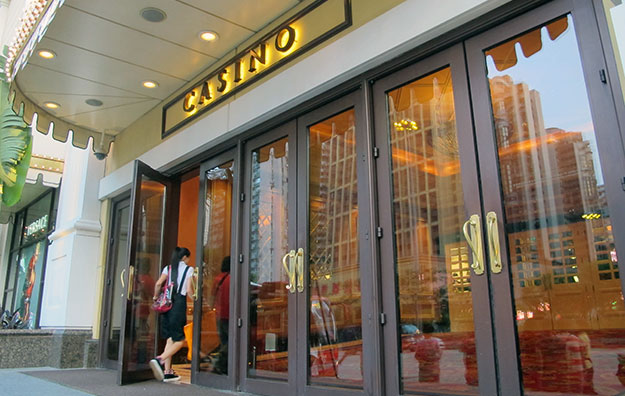Final read-vote Tuesday on Macau off-duty casino entry ban
Dec 17, 2018 Newsdesk Latest News, Macau, Top of the deck

Macau’s Legislative Assembly is scheduled to hold on Tuesday (December 18) afternoon a final reading debate and vote on a government-backed bill proposing a ban on the city’s gaming workers entering casino floors outside work hours.
The new rules – if approved – are expected to cover a total of 54,000 Macau casino employees. The figure includes an estimated 8,000 staff employed by junket operators, according to a report produced by a working committee of the Macau Legislative Assembly asked to scrutinise the bill.
The document stated that representatives from the Macau government had told the working committee that local authorities did not plan to extended the ban on entering casino floors to other professional groups or to all Macau residents.
The government had previously said that the bill aimed to curb problem gambling among casino employees, particularly card dealers. According to official data, the majority of people seeking help in Macau between 2011 and 2017 for problem gaming-related issues were casino workers.
According to the draft legislation, some staff that are hired by the casino operators and not directly involved with gaming operations – including cage staff, food and beverage outlet workers, cleaners and those connected to surveillance operations – are also included in the ban, alongside gaming workers.
Outsourced workers providing service inside casinos however are not covered by the proposed casino entry ban. The government considered it would be too difficult to monitor those workers as they are regularly assigned by their employers to provide service in different venues, said the Legislative Assembly committee’s report.
The bill envisages Macau casino workers being allowed to gamble in local casinos only on the first three days of the annual Chinese New Year holiday period. Casino workers would also be permitted to step onto gaming floors outside work hours if it were related to professional training or education, or if “participating in an association’s event”.
The bill proposes a 12-months’ grace period in order for workers to adapt to the new restrictions.
One of the main issues concerning the bill is related with potential problems with its implementation. The report by the Legislative Assembly committee stated that the city’s casino regulator – the Gaming Inspection and Coordination Bureau, also known by its Portuguese acronym DICJ – would be tasked with implementing the ban on the city’s gaming workers entering casino floors outside work hours. That would include DICJ deploying inspectors inside casinos to detect potential infractions, namely with support from casino operators. In addition, the government would also set up a hotline for reporting of potential infringements.
The bill does not envision the establishment of a database with details on all casino workers covered by the ban. Representatives from the casino regulator told members of the Legislative Assembly committee that the absence of such database did not pose a problem to ensure implementation of the new rules.
The DICJ representatives explained that the city’s civil servants were already banned by dint of their professional role, from entering casino floors; although DICJ had no database with information on all civil servants, the casino regulator stated that implementation of such ban was taking place smoothly based on investigative work by its inspectors.
Related articles
-
 Macau average 5-star 1H rate 96pct of...
Macau average 5-star 1H rate 96pct of...Jul 22, 2024
-
 3 Macau ops had back office IT hit by...
3 Macau ops had back office IT hit by...Jul 22, 2024
More news
-
 Donaco EBITDA up y-o-y to above US$4mln...
Donaco EBITDA up y-o-y to above US$4mln...Jul 26, 2024
-
 HK listed Palasino upgrades Czech...
HK listed Palasino upgrades Czech...Jul 26, 2024
Latest News
Jul 26, 2024
Border-casino operator Donaco International Ltd has achieved a 164.17-percent year-on-year increase in its latest quarterly group earnings before interest, taxation, depreciation and amortisation...Sign up to our FREE Newsletter
 (Click here for more)
(Click here for more)
Pick of the Day
”We’ve got more traction outside of Macau at the moment. But Macau’s going be a bigger focus for us”
David Punter
Regional representative at Konami Australia
Most Popular
 Sheraton brand to exit Londoner Macao, to be Londoner Grand July 25, 2024
Sheraton brand to exit Londoner Macao, to be Londoner Grand July 25, 2024  Macau regulator probes unlicensed gaming agents July 24, 2024
Macau regulator probes unlicensed gaming agents July 24, 2024  Philippines gives 20k aliens in POGOs 60 days to leave July 25, 2024
Philippines gives 20k aliens in POGOs 60 days to leave July 25, 2024  Philippines-listed DigiPlus says not affected by POGO ban July 24, 2024
Philippines-listed DigiPlus says not affected by POGO ban July 24, 2024  Sands China 2Q EBITDA down q-o-q amid low hold, renovation July 25, 2024
Sands China 2Q EBITDA down q-o-q amid low hold, renovation July 25, 2024






